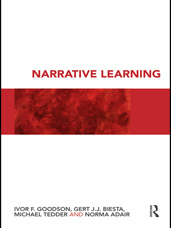Narrative Learning
Towards a Theory of Narrative Learning
Our cases provide ample evidence of reflection on, storying about and re-storying of the self. We saw this, for example, in the case of Christopher’s personally crafted narrative and his ongoing narration. There we argued that the personal element of his narrative and narration did not so much lie in some kind of ‘carte blanche’ but more in a systematic ‘bricolage’ by which a personal mosaic is created of many different, socially available scripts. In Christopher’s case this personally crafted creation provides a vocational pathway and livelihood throughout his life and an existential agenda. A similar kind of ‘harmonisation’ of learning, identity and agency construction can be found in Eva’s case where we observed that Eva not only creates a story which helped her to make sense of her life – which shows how her sense of self is the central element in the ongoing emplotment of the life story – but also creates a narrative and develops narration that provides her with a focus for identity development that is not just self-referential but has important action potential. Our discussion of Russell Jackson’s case provides further clarification of these elements of narrative learning in relation to self, identity and agency. As we wrote in the chapter:
The narrative we can construct from the interviews suggests that Russell’s stories and story-making fulfil two functions. The first is that storying is a tool for reflection: life stories allowed Russell to ‘objectify’ his life, to make it into an object of reflection so that a different understanding of life can be achieved and the process helps make conspicuous the values that are important. The second is that storying has an integrative role: it is possible to achieve synthesis of different aspects of experience, the integration of different forms of learning over time, through the process of making stories. Russell’s life stories show how there are identifiable ‘things’ that he learned for his life, such as the knowledge that enabled him to follow his career. However, such identifiable learning is inseparable from the understanding that Russell has developed over the years about himself, about his character and dispositions, and how that self relates to others in his family, in his workplace and in his social networks.
Whilst in all of these cases learning, agency and identity constructions are to a degree harmonized, in each case the balance is different and judgements about efficacy vary accordingly. The delicate equation of how life narratives are employed and how narration is processed depends on the balance of learning, identity and agency. We saw in Chapter 2 how John Peel developed his identity around a well-established role as a farmer. His life story was concentrated within this farming milieu. As a result of accepting and following the farming script he was unpractised in narrative learning and the process of narration – commenting at one stage, whilst recounting his life story, that it seemed a ‘false’ conversation. When the context of farming changed this left John in a very unfamiliar situation for in a sense his whole life world was changed by external forces beyond his control. His birthright script was redundant but he was unpractised in script development since he was primarily used to following the script he had, a script that served him well for most of his life.
In Chapter 3 we saw Marie Tuck moving, during the course of the interviews, from a descriptive towards a more analytical and evaluative mode of narration. One of the fascinations of longitudinal study is the capacity to register these ‘life course’ changes and, particularly in Marie’s case, the accompanying changes in narration and narrative learning. Her celebration of agency and identity transition is very deeply felt. As she put it: ‘I’m a single mother of two that can stand on her own two feet, doesn’t need you or anybody else. Don’t want you or anybody else... And I just felt so bloody good, I tell ya, and I still do.’ (Mary Tuck, Interview 7, February 2007)
